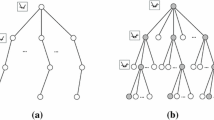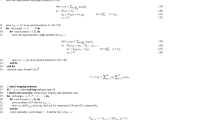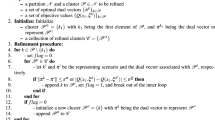Abstract
The long-term hydrothermal scheduling is one of the most important problems to be solved in the power systems area. This problem aims to obtain an optimal policy, under water (energy) resources uncertainty, for hydro and thermal plants over a multi-annual planning horizon. It is natural to model the problem as a multi-stage stochastic program, a class of models for which algorithms have been developed. The original stochastic process is represented by a finite scenario tree and, because of the large number of stages, a sampling-based method such as the Stochastic Dual Dynamic Programming (SDDP) algorithm is required. The purpose of this paper is two-fold. Firstly, we study the application of two alternative sampling strategies to the standard Monte Carlo—namely, Latin hypercube sampling and randomized quasi-Monte Carlo—for the generation of scenario trees, as well as for the sampling of scenarios that is part of the SDDP algorithm. Secondly, we discuss the formulation of stopping criteria for the optimization algorithm in terms of statistical hypothesis tests, which allows us to propose an alternative criterion that is more robust than that originally proposed for the SDDP. We test these ideas on a problem associated with the whole Brazilian power system, with a three-year planning horizon.
Similar content being viewed by others
References
Bailey, T.G., Jensen, P., Morton, D.: Response surface analysis of two-stage stochastic linear programming with recourse. Nav. Res. Logist. 46, 753–778 (1999)
Bayraksan, G., Morton, D.P.: Assessing solution quality in stochastic programs. Math. Program. 108, 495–514 (2006)
Chen, Z.L., Powell, W.B.: Convergent cutting plane and partial-sampling algorithm for multistage stochastic linear programs with recourse. J. Optim. Theory Appl. 102, 497–524 (1999)
Chiralaksanakul, A., Morton, D.P.: Assessing policy quality in multi-stage stochastic programming. Manuscript, The University of Texas at Austin, available at SPEPS. http://edoc.hu-berlin.de/browsing/speps/ (2004)
de Matos, V.L., Finardi, E.C.: A stochastic optimization model for long term hydrothermal scheduling. Manuscript, Laboratório de Planejamento de Sistemas de Energia Elétrica, Federal University of Santa Catarina, Brazil (2010)
de Matos, V.L., Finardi, E.C., da Silva, E.L.: Comparison between the energy equivalent reservoir per subsystem and per cascade in the long-term operation planning in Brazil. In: EngOpt 2008-International Conference on Engineering Optimization, Rio de Janeiro (2008)
Donohue, C., Birge, J.R.: The abridged nested decomposition method for multistage stochastic programming. Algorithmic Oper. Res. 1(1), 20–30 (2006)
dos Santos, M.L., da Silva, E.L., Finardi, E.C., Goncalves, R.E.: Practical aspects in solving the medium-term operation planning problem of hydrothermal power systems by using the progressive hedging method. Int. J. Electr. Power Energy Syst. 31(9), 546–552 (2009)
Drew, S.S., Homem-de-Mello, T.: Quasi-Monte Carlo strategies for stochastic optimization. In: Perrone, L.F., Wieland, F.P., Liu, J., Lawson, B.G., Nicol, D.M., Fujimoto, R.M. (eds.) Proceedings of the 2006 Winter Simulation Conference, pp. 774–782. IEEE Press, New York (2006)
Finardi, E.C., da Silva, E.L.: Solving the hydro unit commitment problem via dual decomposition and sequential quadratic programming. IEEE Trans. Power Syst. 21(2), 835–844 (2006)
Friedel, I., Keller, A.: Fast generation of randomized low-discrepancy point sets. In: Monte Carlo and Quasi-Monte Carlo Methods, 2000, Hong Kong, pp. 257–273. Springer, Berlin (2002). Software available at http://www.multires.caltech.edu/software/libseq/
Heitsch, H., Römisch, W.: Scenario tree modeling for multistage stochastic programs. Math. Program. 118, 371–406 (2009)
Hilli, P., Pennanen, T.: Numerical study of discretizations of multistage stochastic programs. Kybernetika 44(2), 185–204 (2008)
Hindsberger, M., Philpott, A.B.: ReSa: A method for solving multi-stage stochastic linear programs. In: SPIX Stochastic Programming Symposium, Berlin (2001)
Homem-de-Mello, T.: On rates of convergence for stochastic optimization problems under non-i.i.d. sampling. SIAM J. Optim. 19(2), 524–551 (2008)
Infanger, G., Morton, D.P.: Cut sharing for multistage stochastic linear programs with interstage dependency. Math. Program. 75, 241–256 (1996)
Kalagnanam, J., Diwekar, U.: An efficient sampling technique for off-line quality control. Technometrics 39(3), 308–319 (1997)
Koivu, M.: Variance reduction in sample approximations of stochastic programs. Math. Program. 103(3), 463–485 (2005)
L’Ecuyer, P., Lemieux, C.: Recent advances in randomized quasi-Monte Carlo methods. In: Dror, M., L’Ecuyer, P., Szidarovszky, F. (eds.) Modeling Uncertainty: An Examination of Stochastic Theory, Methods, and Applications, pp. 419–474. Kluwer Academic, Boston (2002)
Linderoth, J.T., Shapiro, A., Wright, S.J.: The empirical behavior of sampling methods for stochastic programming. Ann. Oper. Res. 142(1), 215–241 (2006)
Loh, W.: On Latin hypercube sampling. Ann. Stat. 24(5), 2058–2080 (1996)
Mak, W.K., Morton, D.P., Wood, R.K.: Monte Carlo bounding techniques for determining solution quality in stochastic programs. Oper. Res. Lett. 24, 47–56 (1999)
McKay, M.D., Beckman, R.J., Conover, W.J.: A comparison of three methods for selecting values of input variables in the analysis of output from a computer code. Technometrics 21, 239–245 (1979)
Morton, D.P.: Stopping rules for a class of sampling-based stochastic programming algorithms. Oper. Res. 46(5), 710–718 (1998)
Niederreiter, H.: Random Number Generation and Quasi-Monte Carlo Methods. SIAM, Philadelphia (1992)
Noakes, D.J., McLeod, A.I., Hipel, K.W.: Forecasting monthly riverflow time series. Int. J. Forecast. 1(2), 179–190 (1985)
Owen, A.B.: Monte Carlo variance of scrambled net quadrature. SIAM J. Numer. Anal. 34(5), 1884–1910 (1997)
Owen, A.B.: Latin supercube sampling for very high-dimensional simulations. ACM Trans. Model. Comput. Simul. 8, 71–102 (1998)
Pennanen, T.: Epi-convergent discretizations of multistage stochastic programs. Math. Oper. Res. 30, 245–256 (2005)
Pennanen, T., Koivu, M.: Epi-convergent discretizations of stochastic programs via integration quadratures. Numer. Math. 100, 141–163 (2005)
Pereira, M.V.F., Pinto, L.M.V.G.: Multi-stage stochastic optimization applied to energy planning. Math. Program. 52, 359–375 (1991)
Philpott, A., Guan, Z.: On the convergence of stochastic dual dynamic programming and related methods. Oper. Res. Lett. 36, 450–455 (2008)
Ruszczyński, A.: Decomposition methods. In: Ruszczyński, A., Shapiro, A. (eds.) Handbook of Stochastic Optimization. Elsevier, Amsterdam (2003)
Shapiro, A.: Monte Carlo sampling methods. In: Ruszczyński, A., Shapiro, A. (eds.) Handbook of Stochastic Optimization. Elsevier, Amsterdam (2003a)
Shapiro, A.: Inference of statistical bounds for multistage stochastic programming problems. Math. Methods Oper. Res. 58, 57–68 (2003b)
Shapiro, A.: Analysis of stochastic dual dynamic programming method. Eur. J. Oper. Res. 209, 63–72 (2011)
Shapiro, A., Homem-de-Mello, T.: A simulation-based approach to two-stage stochastic programming with recourse. Math. Program. 81, 301–325 (1998)
Shapiro, A., Homem-de-Mello, T., Kim, J.C.: Conditioning of convex piecewise linear stochastic programs. Math. Program. 94, 1–19 (2002)
Spanier, J.: Quasi-Monte Carlo methods for particle transport problems. In: Niederreiter, H., Shiue, P. (eds.) Monte Carlo and Quasi-Monte Carlo Methods in Scientific Computing, pp. 121–148. Springer, New York (1995)
Stein, M.L.: Large sample properties of simulations using Latin hypercube sampling. Technometrics 29, 143–151 (1987)
Wasserman, L.: All of Statistics: A Concise Course in Statistical Inference. Springer, Berlin (2004)
Author information
Authors and Affiliations
Corresponding author
Rights and permissions
About this article
Cite this article
Homem-de-Mello, T., de Matos, V.L. & Finardi, E.C. Sampling strategies and stopping criteria for stochastic dual dynamic programming: a case study in long-term hydrothermal scheduling. Energy Syst 2, 1–31 (2011). https://doi.org/10.1007/s12667-011-0024-y
Received:
Accepted:
Published:
Issue Date:
DOI: https://doi.org/10.1007/s12667-011-0024-y




